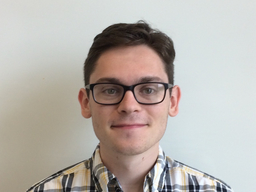PhD Proposal: Cory Nunn
Location
Off Campus : via Webex
Date & Time
May 19, 2020, 1:00 pm – 3:00 pm
Description
ADVISOR: Dr. Todd Pittman
TITLE: Experimental Noiseless Attenuation and Quantum Optical State Preparation
ABSTRACT: One of the greatest challenges of quantum communication is transmission of quantum states across noisy or lossy channels. To mitigate the effects of decoherence in a lossy channel, one promising method (the Micuda protocol) uses probabilistic devices known as noiseless attenuators and noiseless amplifiers. Previous work has primarily focused on the latter, but noiseless attenuation (NA) has yet to be fully explored and demonstrated experimentally. A noiseless attenuator is a device which uses conditional measurements to reduce the average photon number of a quantum optical state. Here I propose research to demonstrate NA in two different but related systems. The first is a beam-splitter, the output of which is typically attenuated by its classical transmittance T. The beam-splitter can be converted into a noiseless attenuator by measuring its auxiliary output and conditioning that it contain zero photons. Surprisingly, this lowers the average photon number of superposition states, despite no photons being physically removed from the system. The second system is a conventional optical parametric amplifier (OPA), which is typically used to increase the amplitude of input states. Remarkably, the OPA can also function as a noiseless attenuator when similar conditional measurements are used, as above. We find that when the OPA fails to amplify the input, it actually attenuates.
Using the same experimental techniques with somewhat different conditional measurements, we can use the OPA to generate other types of output states. In a third experiment, one ancilla photon is sent into the idler mode of the OPA and detected on the other side. Although the OPA once again fails to amplify, the output may be transformed into interesting non-classical states, which have other applications in quantum communication. The counterintuitive effects in all three of these experiments are only possible due to the non-classical character of the input states and the probabilistic nature of the conditional measurement process. Leveraging these, our experiments will contribute to our understanding of amplification and noise in OPAs, as well as experimental techniques for quantum communications.
Proposal will be held using Webex.
TITLE: Experimental Noiseless Attenuation and Quantum Optical State Preparation
ABSTRACT: One of the greatest challenges of quantum communication is transmission of quantum states across noisy or lossy channels. To mitigate the effects of decoherence in a lossy channel, one promising method (the Micuda protocol) uses probabilistic devices known as noiseless attenuators and noiseless amplifiers. Previous work has primarily focused on the latter, but noiseless attenuation (NA) has yet to be fully explored and demonstrated experimentally. A noiseless attenuator is a device which uses conditional measurements to reduce the average photon number of a quantum optical state. Here I propose research to demonstrate NA in two different but related systems. The first is a beam-splitter, the output of which is typically attenuated by its classical transmittance T. The beam-splitter can be converted into a noiseless attenuator by measuring its auxiliary output and conditioning that it contain zero photons. Surprisingly, this lowers the average photon number of superposition states, despite no photons being physically removed from the system. The second system is a conventional optical parametric amplifier (OPA), which is typically used to increase the amplitude of input states. Remarkably, the OPA can also function as a noiseless attenuator when similar conditional measurements are used, as above. We find that when the OPA fails to amplify the input, it actually attenuates.
Using the same experimental techniques with somewhat different conditional measurements, we can use the OPA to generate other types of output states. In a third experiment, one ancilla photon is sent into the idler mode of the OPA and detected on the other side. Although the OPA once again fails to amplify, the output may be transformed into interesting non-classical states, which have other applications in quantum communication. The counterintuitive effects in all three of these experiments are only possible due to the non-classical character of the input states and the probabilistic nature of the conditional measurement process. Leveraging these, our experiments will contribute to our understanding of amplification and noise in OPAs, as well as experimental techniques for quantum communications.
Proposal will be held using Webex.
